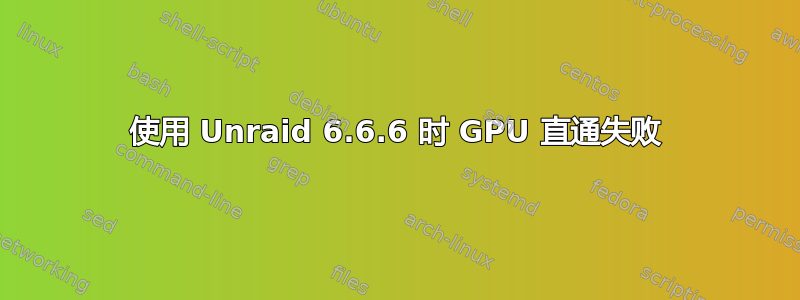
不久前,我构建了一个新的 Ryzen 设置。我目前正在尝试使用 Unraid 6.6.6,并尝试使用来自 Inno3D 的 GTX 1060 设置我的日常 Ubuntu VM。不幸的是,我收到了与 GPU 相关的错误消息。
- 设置 -
主板:华擎 - B450M Pro4
CPU:AMD Ryzen 5 2600 六核 @ 3400
GPU:Inno3d 的 GTX 1060 6Gb
HVM 和 IOMMU:已启用(根据 Unraid 的信息面板)
我尝试过使用许多不同的图形 ROM Bioses 来传递 GPU。一个直接来自 Techpowerup,一个是第一个,但根据 SpaceinvaderOne 的这些说明进行了修改,一个取自 Spaceinvaders 帖子,其中包含社区转储列表(我从 EVGA 那里获得了 1060 可用的转储)。所有这些操作都失败了,并显示以下错误消息:
2018-12-16T22:17:35.335767Z qemu-system-x86_64: -device vfio-pci,host=23:00.0,id=hostdev0,bus=pci.4,addr=0x0,romfile=/mnt/disk1/isos/vbios/GTX1060.Inno3D.rom: Failed to mmap 0000:23:00.0 BAR 3. Performance may be slow
2018-12-16T22:17:35.410501Z qemu-system-x86_64: vfio: Cannot reset device 0000:23:00.0, depends on group 22 which is not owned.
2018-12-16T22:17:36.818822Z qemu-system-x86_64: vfio: Cannot reset device 0000:23:00.0, depends on group 22 which is not owned.
编号为 0000:23:00 的 PCI 设备就是上述 GPU。关闭虚拟机后,我在日志中看到以下错误,再次表明 GPU 出现了问题(只复制了一次,但在日志中出现了多次):
2018-12-16T22:18:08.354094Z qemu-system-x86_64: vfio_region_write(0000:23:00.0:region3+0x1098, 0x0,8) failed: Device or resource busy
所以我认为问题在于我的显卡被系统的其他部分使用。在网上寻找答案时,我找到了这篇关于这个问题的帖子。我理解作者的解释,但修复方法对我没有用。
我的虚拟机配置如下。由于我对 Unraid 还很陌生,因此我宁愿发布完整配置,并在一些更有经验的社区成员告诉哪些部分最重要时删除一些部分。
<?xml version='1.0' encoding='UTF-8'?>
<domain type='kvm' id='5'>
<name>Ubuntu New</name>
<uuid>f6167326-d81b-2eb2-c0f4-4c5d33c40eee</uuid>
<metadata>
<vmtemplate xmlns="unraid" name="Ubuntu" icon="ubuntu.png" os="ubuntu"/>
</metadata>
<memory unit='KiB'>8388608</memory>
<currentMemory unit='KiB'>8388608</currentMemory>
<memoryBacking>
<nosharepages/>
</memoryBacking>
<vcpu placement='static'>4</vcpu>
<cputune>
<vcpupin vcpu='0' cpuset='4'/>
<vcpupin vcpu='1' cpuset='5'/>
<vcpupin vcpu='2' cpuset='8'/>
<vcpupin vcpu='3' cpuset='9'/>
</cputune>
<resource>
<partition>/machine</partition>
</resource>
<os>
<type arch='x86_64' machine='pc-q35-3.0'>hvm</type>
<loader readonly='yes' type='pflash'>/usr/share/qemu/ovmf-x64/OVMF_CODE-pure-efi.fd</loader>
<nvram>/etc/libvirt/qemu/nvram/f6167326-d81b-2eb2-c0f4-4c5d33c40eee_VARS-pure-efi.fd</nvram>
</os>
<features>
<acpi/>
<apic/>
</features>
<cpu mode='host-passthrough' check='none'>
<topology sockets='1' cores='4' threads='1'/>
</cpu>
<clock offset='utc'>
<timer name='rtc' tickpolicy='catchup'/>
<timer name='pit' tickpolicy='delay'/>
<timer name='hpet' present='no'/>
</clock>
<on_poweroff>destroy</on_poweroff>
<on_reboot>restart</on_reboot>
<on_crash>restart</on_crash>
<devices>
<emulator>/usr/local/sbin/qemu</emulator>
<disk type='file' device='disk'>
<driver name='qemu' type='raw' cache='writeback'/>
<source file='/mnt/user/domains/Ubuntu New/vdisk1.img'/>
<backingStore/>
<target dev='hdc' bus='virtio'/>
<boot order='1'/>
<alias name='virtio-disk2'/>
<address type='pci' domain='0x0000' bus='0x03' slot='0x00' function='0x0'/>
</disk>
<disk type='file' device='cdrom'>
<driver name='qemu' type='raw'/>
<source file='/mnt/user/isos/ubuntu-18.04.1-desktop-amd64.iso'/>
<backingStore/>
<target dev='hda' bus='sata'/>
<readonly/>
<boot order='2'/>
<alias name='sata0-0-0'/>
<address type='drive' controller='0' bus='0' target='0' unit='0'/>
</disk>
<controller type='usb' index='0' model='ich9-ehci1'>
<alias name='usb'/>
<address type='pci' domain='0x0000' bus='0x00' slot='0x07' function='0x7'/>
</controller>
<controller type='usb' index='0' model='ich9-uhci1'>
<alias name='usb'/>
<master startport='0'/>
<address type='pci' domain='0x0000' bus='0x00' slot='0x07' function='0x0' multifunction='on'/>
</controller>
<controller type='usb' index='0' model='ich9-uhci2'>
<alias name='usb'/>
<master startport='2'/>
<address type='pci' domain='0x0000' bus='0x00' slot='0x07' function='0x1'/>
</controller>
<controller type='usb' index='0' model='ich9-uhci3'>
<alias name='usb'/>
<master startport='4'/>
<address type='pci' domain='0x0000' bus='0x00' slot='0x07' function='0x2'/>
</controller>
<controller type='sata' index='0'>
<alias name='ide'/>
<address type='pci' domain='0x0000' bus='0x00' slot='0x1f' function='0x2'/>
</controller>
<controller type='pci' index='0' model='pcie-root'>
<alias name='pcie.0'/>
</controller>
<controller type='pci' index='1' model='pcie-root-port'>
<model name='pcie-root-port'/>
<target chassis='1' port='0x8'/>
<alias name='pci.1'/>
<address type='pci' domain='0x0000' bus='0x00' slot='0x01' function='0x0' multifunction='on'/>
</controller>
<controller type='pci' index='2' model='pcie-root-port'>
<model name='pcie-root-port'/>
<target chassis='2' port='0x9'/>
<alias name='pci.2'/>
<address type='pci' domain='0x0000' bus='0x00' slot='0x01' function='0x1'/>
</controller>
<controller type='pci' index='3' model='pcie-root-port'>
<model name='pcie-root-port'/>
<target chassis='3' port='0xa'/>
<alias name='pci.3'/>
<address type='pci' domain='0x0000' bus='0x00' slot='0x01' function='0x2'/>
</controller>
<controller type='pci' index='4' model='pcie-root-port'>
<model name='pcie-root-port'/>
<target chassis='4' port='0xb'/>
<alias name='pci.4'/>
<address type='pci' domain='0x0000' bus='0x00' slot='0x01' function='0x3'/>
</controller>
<controller type='pci' index='5' model='pcie-root-port'>
<model name='pcie-root-port'/>
<target chassis='5' port='0xc'/>
<alias name='pci.5'/>
<address type='pci' domain='0x0000' bus='0x00' slot='0x01' function='0x4'/>
</controller>
<controller type='pci' index='6' model='pcie-root-port'>
<model name='pcie-root-port'/>
<target chassis='6' port='0xd'/>
<alias name='pci.6'/>
<address type='pci' domain='0x0000' bus='0x00' slot='0x01' function='0x5'/>
</controller>
<controller type='virtio-serial' index='0'>
<alias name='virtio-serial0'/>
<address type='pci' domain='0x0000' bus='0x02' slot='0x00' function='0x0'/>
</controller>
<interface type='bridge'>
<mac address='52:54:00:47:af:f1'/>
<source bridge='br0'/>
<target dev='vnet0'/>
<model type='virtio'/>
<alias name='net0'/>
<address type='pci' domain='0x0000' bus='0x01' slot='0x00' function='0x0'/>
</interface>
<serial type='pty'>
<source path='/dev/pts/0'/>
<target type='isa-serial' port='0'>
<model name='isa-serial'/>
</target>
<alias name='serial0'/>
</serial>
<console type='pty' tty='/dev/pts/0'>
<source path='/dev/pts/0'/>
<target type='serial' port='0'/>
<alias name='serial0'/>
</console>
<channel type='unix'>
<source mode='bind' path='/var/lib/libvirt/qemu/channel/target/domain-5-Ubuntu New/org.qemu.guest_agent.0'/>
<target type='virtio' name='org.qemu.guest_agent.0' state='disconnected'/>
<alias name='channel0'/>
<address type='virtio-serial' controller='0' bus='0' port='1'/>
</channel>
<input type='mouse' bus='ps2'>
<alias name='input0'/>
</input>
<input type='keyboard' bus='ps2'>
<alias name='input1'/>
</input>
<hostdev mode='subsystem' type='pci' managed='yes'>
<driver name='vfio'/>
<source>
<address domain='0x0000' bus='0x23' slot='0x00' function='0x0'/>
</source>
<alias name='hostdev0'/>
<rom file='/mnt/user/isos/vbios/GTX1060.Inno3D.rom'/>
<address type='pci' domain='0x0000' bus='0x04' slot='0x00' function='0x0'/>
</hostdev>
<hostdev mode='subsystem' type='usb' managed='no'>
<source>
<vendor id='0x046d'/>
<product id='0xc52b'/>
<address bus='1' device='2'/>
</source>
<alias name='hostdev1'/>
<address type='usb' bus='0' port='1'/>
</hostdev>
<hostdev mode='subsystem' type='usb' managed='no'>
<source>
<vendor id='0x06a3'/>
<product id='0x0cfa'/>
<address bus='3' device='2'/>
</source>
<alias name='hostdev2'/>
<address type='usb' bus='0' port='2'/>
</hostdev>
<memballoon model='none'/>
</devices>
<seclabel type='dynamic' model='dac' relabel='yes'>
<label>+0:+100</label>
<imagelabel>+0:+100</imagelabel>
</seclabel>
</domain>
我还检查了我的组件的兼容性,但没有发现任何确凿的证据表明存在任何硬件限制。
Unraid 论坛上的相应问题是这。
我有点绝望并且愿意接受任何想法......
答案1
PCIe 直通不是基于设备,而是基于组。系统会告诉您,您的 GPU 与另一台设备位于同一组中,您不会直通该设备,而是从主机使用该设备。
启动内核日志将告诉您有关这些组的信息,如果您发布相关部分,我们也许能够进一步帮助您。
答案2
我的建议是:
首先,使用 VNC 安装操作系统
然后,更新您的 VM 设置,加载图形卡 BIOS,然后 BOOM,它就可以工作了。


